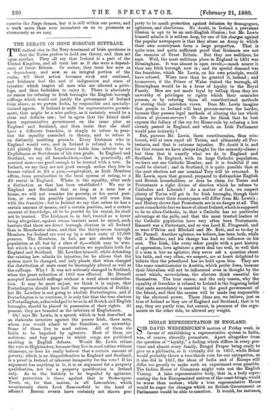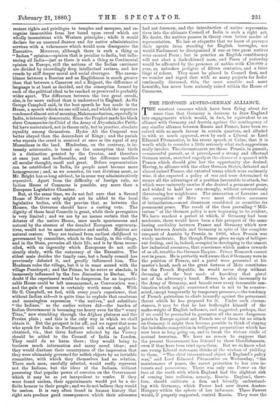INDIAN REPRESENTATION IN ENGLAND.
SER DAVID WEDDERB1JRN'S motion of Friday week, in favour of establishing a representative system in India, was, of course, absurdly premature. Apart altogether from the question of loyalty," a feeling which differs in every pro- vince and almost every family, Bengal Proper being ready to give us a plebiscite, as it virtually did in 1857, while Behar would probably throw a two-thirds vote for our extirpation, as it also did in 1857, the ideas of India and of Europe still differ too greatly to make such an experiment even possible. The Indian House of Commons might vote out the English Viceroy. A false representative body, that is, a body repre- senting the few Europeanised natives of the coast-fringe, would be worse than useless; while a true representative House would be eager for changes which no British Government or Parliament would be able to sanction. It would, for instance, restore rights and privileges to temples and mosques, and re- cognise immunities from law based upon creed which are wholly inconsistent with Western principles ; while it would declare for an unsound finance and for native administrative services with a vehemence which would soon disorganise the Executive. Moreover, although there is such a thing as "Indian" opinion—opinion that is peculiar to India, but influ- encing all India—just as there is such a thing as Continental opinion in Europe, still the nations of the Indian continent are divided by exceedingly deep intellectual ravines, and her creeds by stir deeper moral and social cleavages. The resem- blance between a Russian and an Englishman is much greater than that between a Canarese and a Rajpoot, the difference of language is at least as decided, and the conception formed by each of the political ideal to be reached or preserved is probably wider apart. The difference between the two great creeds, also, is far more radical than is understood in England. As Sir George Campbell said, in the best speech he has made in the House, a speech which no one will read, and which the reporters condensed almost out of meaning, Mahommedanism, especially in India, is intensely democratic. Since the Prophet made his black slave Commander-in-Chief of the Army of Abyssinia,the Faith- ful have maintained, not in theory only, but in practice, absolute equality among themselves. Hyder Ali the Corporal was better obeyed than the descendant of Kings ; and the pariah who repeats the creed is received at once as the equal of any Mussulman in the land. Hindooism, on the contrary, is in- tensely aristocratic, is based on the conception that birth is a distinction granted by the Creator, and therefore at once just and ineffaceable, and the difference modifies all secular thought, small and great. Before representation can be established in India, its people must become more homogeneous ; and, as we conceive, its vast divisions must, as Mr. Bright has so long advised, be in some way administratively separated. Apart from the difficulty of foreign rule, no Indian House of Commons is possible, any more than a European Legislative Chamber. But, at the same time, we do not feel sure that a Second House of Natives only might not be added to the local legislative bodies, with the proviso that, as between the Houses, the Governor should have a casting vote. The dignity of those local Councils is great, while their prerogative is very limited ; and we are by no means certain that the debates of the native House, once made spontaneous and natural by the absence of the dreaded European representa- tives, would not be most instructive and useful. Natives are natural orators. They are trained from earliest childhood to government by committee, which in the family, in the village, and in the State, pervades all their life, and is by them recon- ciled, with an ingenuity which Europeans do not suffi- ciently study, with the autocracy of the Executive. The eldest male decides the family case but a family council has previously debated it, and greatly influenced him. The Headman rules the village, but it is in some accord with the village Punchayet ; and the Prince, be he never so absolute, is immensely influenced by the free discussion in Durbar. We doubt if the experiment would be dangerous, for an impracti- cable House could be left unsummoned, as Convocation was ; and the gain of success is certainly worth some risk. With Sir G. Campbell, we feel, with every year's experience, that without Indian aid—it is quite time to explode that cumbrous and meaningless expression "the natives," and substitute "the Indians," as the earlier writers did—the burden of Indian Government is becoming too heavy even for the" weary Titan," now stumbling through the Afghan plateaus and the Persian plain ; and this is the only way in which we shall obtain it. But the prospect is far off, and we regret that none who speak for India in Parliament will ask what might be obtained, viz., that three Indians selected by the Viceroy should be added to the Council of India in London. They could do no harm there ; they would bring to business much information and many novel ideas ; and they would disabuse their countrymen of the impression that they were ultimately governed for selfish objects by an invisible committee, with which they themselves had no relation. Three such men, carefully selected, would really represent not the Indians, but the ideas of the Indians, without possessing that popular power of coercion on the Government which it may be as yet inexpedient to confer. If they were found useless, their appointments would yet be a de- finite honour to their people ; and we do not believe they would be useless. It is very often found in human history that right acts produce good consequences which their advocates had not foreseen, and the introduction of native representa- tives into the ultimate Council of India is such a right act. No doubt, the natives possess in theory even better modes of representation. No law or etiquette that we know of prevents their agents from standing for English boroughs, nor would Parliament be disorganised if one or two great natives were created Peers ; but in practice an English constituency will not elect a dark-skinned man, and Peers of yesterday would be affronted by the presence of nobles with £50,000 a year, an unbroken pedigree of fifteen centuries, and a faint tinge of colour. They must be placed in Council first, and we wonder and regret that with so many projects for India continually discussed, this, the most sensible and most honorific, has never been seriously raised within the House of Commons.



































 Previous page
Previous page